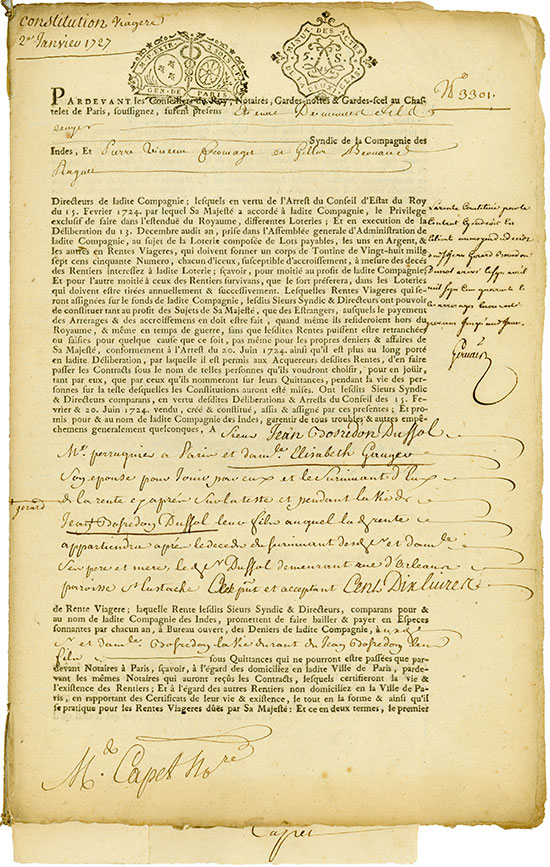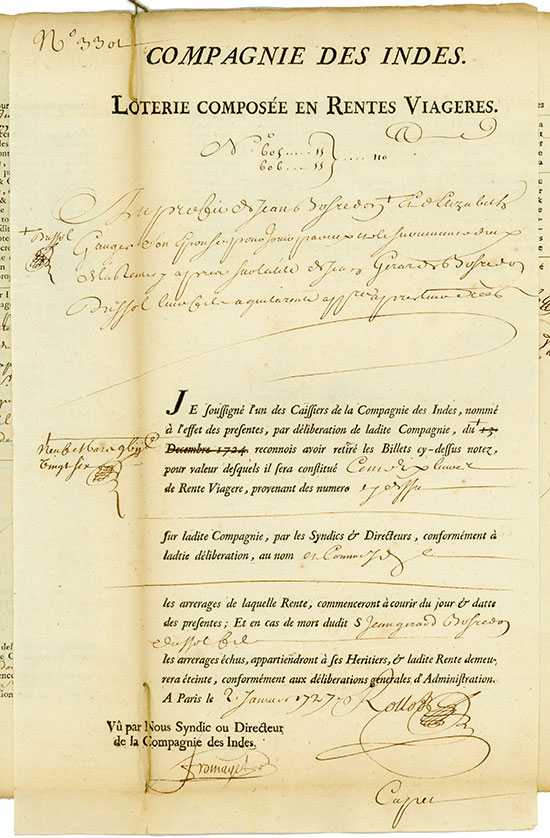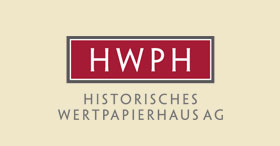Ingelsberg 17 b
D- 85604 Zorneding
Deutschland / Germany
Tel.: +49 (0)8106 - 2461-86
Fax: +49 (0)8106 - 2461-88
E-Mail: auktion@hwph.de
–
|
|
||||
| 474 | ||||
| Compagnie des Indes | ||||
| Paris | ||||
| Frankreich | ||||
| Europa | ||||
| Paris, 02.01.1727, Rente Viagère über 110 Livres, #3301, 34,1 x 22,2 cm, schwarz, beige, DB, Kontrakt mit Zertifikat, Büttenpapier, Rand gebräunt und mit kleinen Einrissen, Erhaltung VF, Shakespeare CI.1, Rarität, R10. Die erste Ausgabe von Rentes Viagères durch die Compagnie des Indes: 1723 übertrug die Krone zahlreiche Privilegien auf die Compagnie des Indes, unter anderem das Kaffee- und Tabakmonopol sowie das Recht, eine nationale Lotterie abzuhalten. In dieser Lotterie wurden einige Preise bar, andere in Rente Viagères bezahlt. Dies erfolgte in Form einer Tontine mit 28.750 Personen. Starb eine Person, wurde die Hälfte des Zinses den überlebenden Personen zugeschlagen. Die andere Hälfte wurde gestrichen. In einer Lotterie wurde dann bestimmt, wem der erhöhte Zins zufällt. Dieses Vorgehen lässt sich bis in die 1760er-Jahre nachweisen. | ||||
| Paris, 2 January 1727, Rente Viagère for 110 Livres, #3301, 34.1 x 22.2 cm, black, beige, 4 pages, contract and certificate, handmade paper, edge browned and with small tears, condition VF, Shakespeare CI.1, rarity, R10. First issue of Rentes Viagères of the Compagnie des Indes. In 1723, the crown granted certain privileges to the Company. Among these were the tax-farm of the exclusive right to sell tobacco and coffee, and also the right to hold national lotteries. In these, certain prizes were to be in cash, and others in rentes viagères, in the form of a tontine of 28.750 names. As a name died, one-half of its interests would accrue to survivors, the other half being cancelled. Numbers were drawn in a lottery to qualify for the increase due on account of deceased lenders. This process continued at least up to the 1760’s. | ||||
| VF | ||||
 |
||||

| ||||
| Die Compagnie des Indes wurde 1664 unter Ludwig XIV. von Jean Baptiste Colbert als Welthandelsgesellschaft ins Leben gerufen und besaß das Handelsprivileg für Ostindien. Kurz nach dem Tod des Sonnenkönigs bekam John Law den Auftrag, die maroden Finanzen des Königreichs zu sanieren. Er fasste die verschiedenen französischen Handelskompagnien zur Mississippi-Gesellschaft zusammen, die er später in Anlehnung an die Kerngesellschaft Colberts wieder in Compagnie des Indes umbenannte. Bis Mai 1720 wurden 500 Schiffe gebaut oder gekauft. Es herrschte Aufbruchstimmung und Euphorie. In diesem Überschaum bediente sich der Staat der Notenpresse. Als Konsequenz folgten steigende Preise – nicht nur für Waren, sondern auch für Aktien. Die Papiere von Law’s Mississippi-Gesellschaft schossen in wenigen Jahren von 500 auf 18.000 Livres in die Höhe. Schon bald konnten die Banken die Noten jedoch nicht mehr einlösen. Law suchte den Ausweg, indem der Nominalwert halbiert wurde. Die Konsequenz war jedoch, dass ganz Frankreich in Aufruhr geriet und Law fliehen musste. | ||||
| The Company des Indes was founded in 1664 by Jean Baptiste Colbert under Louis XIV as a world trading company and owned the trade privilege for East India. Shortly after the death of the sun king, John Law was ordered to improve the ailing finances of the kingdom. He combined various French trade companies to form the Mississippi-Company, which was later renamed Company des Indes alluding to Colbert’s core company. Until May 1720, 500 ships were built or purchased. There was a sense of a new era about optimism and euphoria. In this effervescent situation, the state availed itself of the bill printing press. The consequences were rising prices – not only for merchandise but also for shares. In a few years, the shares of the Mississippi-Company shot up from 500 to 18,000 Livres. But very soon, the banks could no longer honor the bills. Law looked for a way out when the face value was cut in half. However, the consequence was that all of France revolted and Law had to flee. | ||||













